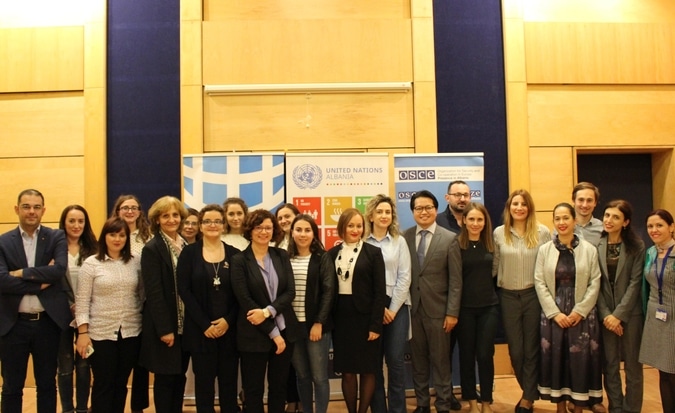Human rights training brings data and statistics to the limelight
National institutions in Albania involved in human rights reporting attended a three-day training co-organized by UN Women, the Office of the UN Resident Coordinator, UNFPA and the OSCE Presence in Albania.Date:

A three-day training on human rights reporting, monitoring and data collection was organized in Tirana for national human rights institutions, line ministries and civil society organizations.
The training adopted a Human-Rights Based Approach to Data, bringing together relevant stakeholders and developing communities of practice committed to improving the quality, relevance and use of data and statistics consistent with international human rights norms and principles.
“In order to contribute to the achievement of the Sustainable Development Goals and Agenda 2030, we need to ensure that the collection, analysis and use of data are consistent with the progressive realization of human rights through a human-rights-based approach to data,” – said Brian Williams, UN Resident Coordinator in Albania.
Speaking during the opening session, the Head of OSCE Presence in Albania, Ambassador Bernd Borchardt said; “Albania has been steadily progressing in the protection of human rights. Most importantly, it established a comprehensive system of laws and institutions that can fulfill international human rights standards and obligations. However, there still lies a path ahead of us. The most important aspect of which is the practical implementation of human rights efforts. How do we actually do it? Monitoring and reporting are the cornerstones of practical implementation.”
The training focused on:
- overview of the international, regional and national human rights frameworks and respective monitoring bodies, cycles and plans
- quality of human rights data collection and reporting; how to measure progress and analyze human rights data for reporting
- practical applications of data collection for human rights reporting by analyzing the third Universal Periodic Review for Albania
“The training was necessary and useful in order to better understand what goes into the monitoring and reporting process and familiarizing institutions on existing mechanisms,” said Bruna Minarolli, a representative from the Ministry for Europe and Foreign Affairs.
Brunilda Dervishaj, a representative of the Ministry of Health and Social Protection, who also participated at the training, said: “The focus of the training on monitoring mechanisms gives us a practical tool to evaluate what we have achieved and where we need to be in the future.”
The session also emphasized the importance of strengthening collaboration between the various governmental and non-governmental actors.
“Keeping our joint goal in mind, I believe that carefully coordinated efforts among civil society representatives during the reporting and monitoring processes, will lead to improved efficiency and better results,” said Irena Shtraza, a representative from the Albanian Women Empowerment Network.
The training was organized by UN Women as part of the the UN Joint Programme on Ending Violence against Women that is financially supported by Sida, and the Office of the UN Resident Coordinator, UNFPA and the OSCE Presence in Albania.